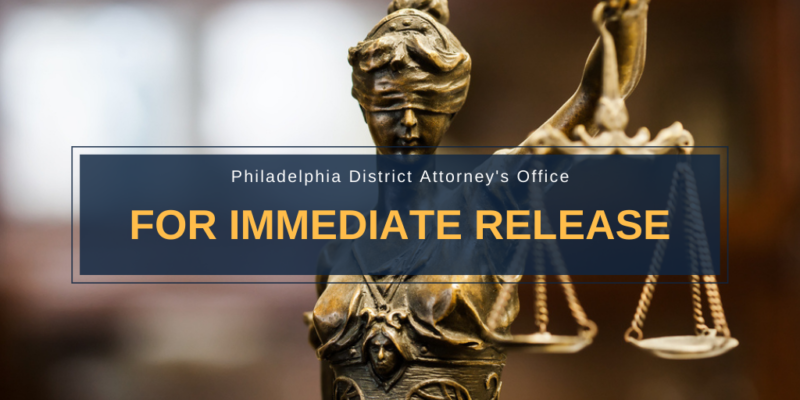
PHILADELPHIA (November 10, 2021) — The Commonwealth Court of Pennsylvania has unanimously decided that the City of Philadelphia, through its agent the Philadelphia Police Department (PPD), must provide officer misconduct information to the District Attorney’s Office, as required by the U.S. Constitution.
In Fraternal Order of Police Lodge №5 v. City of Philadelphia, the entire Commonwealth Court affirmed a trial court decision dismissing the FOP’s complaint that sought to enjoin PPD from providing police misconduct Brady/Giglio information to the DAO. The Court also affirmed a trial court decision dismissing the FOP complaint seeking to enjoin the DAO from maintaining an internal database of that information — the Police Misconduct Database (PMD) — for purposes of disclosing potentially exculpatory or impeaching information to defense counsel in criminal prosecutions, as is required by the Pennsylvania and U.S. constitutions.
“At the outset, we agree with the trial court that DA Krasner and the City have an obligation to disclose all exculpatory information material to the guilt or punishment of an accused, including evidence of an impeachment nature,” the Court found.
“Unquestionably, the District Attorney has an affirmative duty to disclose potentially exculpatory evidence, as well as evidence that could be used to impeach prosecution witnesses, whether that evidence is in the possession of the Office of the District Attorney or the City itself and must provide that evidence to the accused. Furthermore, the City has a derivative duty to assist the District Attorney with fulfilling his constitutional obligation to criminal defendants, by providing the District Attorney, at his request, with information regarding such allegations,” the Court further stated.
Two Commonwealth Court judges partially dissented by going further than the majority in rejecting the FOP’s arguments, finding in a separate opinion that “allowing police officers to interject themselves into the District Attorney’s Brady information disclosure decisions… would run counter to Pennsylvania Supreme Court case law and inevitably lead to violations of criminal defendants’ due process rights” which would be “utterly unacceptable” for “legal, practical, and moral” reasons.
The Hon. Patricia A. McCullough authored the majority opinion. The Hon. Ellen Ceisler authored the concurring and dissenting opinion, which was joined by the Hon. Michael H. Wojcik.
District Attorney Larry Krasner responded, “In this important opinion, the Commonwealth Court unanimously and unequivocally affirmed what the law and constitution state: That police and prosecutors are required to support a fair and open criminal justice process, which means no lying or cheating to get a conviction. Hiding exculpatory evidence, coercing false testimony, putting up officers who lied during arrests on the stand is how this system operated for far too long, ruining untold lives and communities.”
DA Krasner continued, “It is telling, to put it modestly, that the Fraternal Order of Police’s primary complaint here is that officers’ reputations and access to court appearance pay and overtime pay should instead supersede the basic due process rights of civilians. That overreaction toward any measure of accountability for misconduct, abuse, and law-breaking when it comes to their own must be confronted head-on by public officials at every level of government if we are ever to build trust with communities most harmed by corrupt policing and prosecution. That trust is necessary to have the peaceful and safe communities Philadelphians and all Americans deserve.”
The FOP complaint also wrongly focuses on a so-called Do Not Call List, which does not exist in the Krasner administration, and inaccurately describes the process by which the DAO complies with its constitutional obligations to disclose officer misconduct to defense counsel. The Commonwealth Court opinion does not impact the existence of the Police Misconduct Database maintained by the DAO, as the purpose and usage of the PMD are affirmed clearly and unanimously by the Court.
DA Krasner also provided an update on efforts by the DAO to receive officer misconduct information from the PPD. Last August, the DAO took the unprecedented step of seeking court intervention due to a failure by the department to comply with subpoenas for information about officers’ misconduct and credibility. At a hearing on Wednesday, November 10th, before the Hon. Lucretia Clemons, Supervising Judge of the Court of Common Pleas Criminal Division, both parties agreed to continue working toward a resolution that will result in a more efficient, accurate, and fair misconduct disclosure process.
“Following further discussions with our criminal justice partners today, we are very optimistic that the court will support my office’s efforts to achieve the fairest, most transparent, and most credible process for officer misconduct disclosures in this city’s history, as we work to repair harms inflicted on individuals, communities, and taxpayers by the unconstitutional practices of the past,” DA Krasner said.
Since 2018, the DAO Conviction Integrity Unit has secured 23 exonerations of 22 wrongfully convicted individuals. A report on the CIU released last summer found that nearly all of the overturned convictions were marred by official misconduct, such as withholding exculpatory evidence, coercing false confessions, or committing perjury.
CONTACT:
Jane Roh, 215–686–8711, [email protected]
###
The Philadelphia District Attorney’s Office is the largest prosecutor’s office in Pennsylvania, and one of the largest in the nation. It serves the more than 1.5 million residents of the City and County of Philadelphia, employing 600 lawyers, detectives, and support staff. The District Attorney’s Office is responsible for prosecution of approximately 40,000 criminal cases annually.